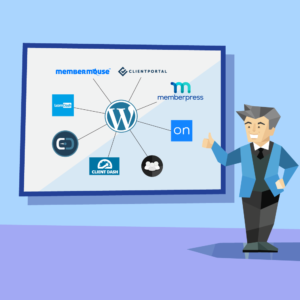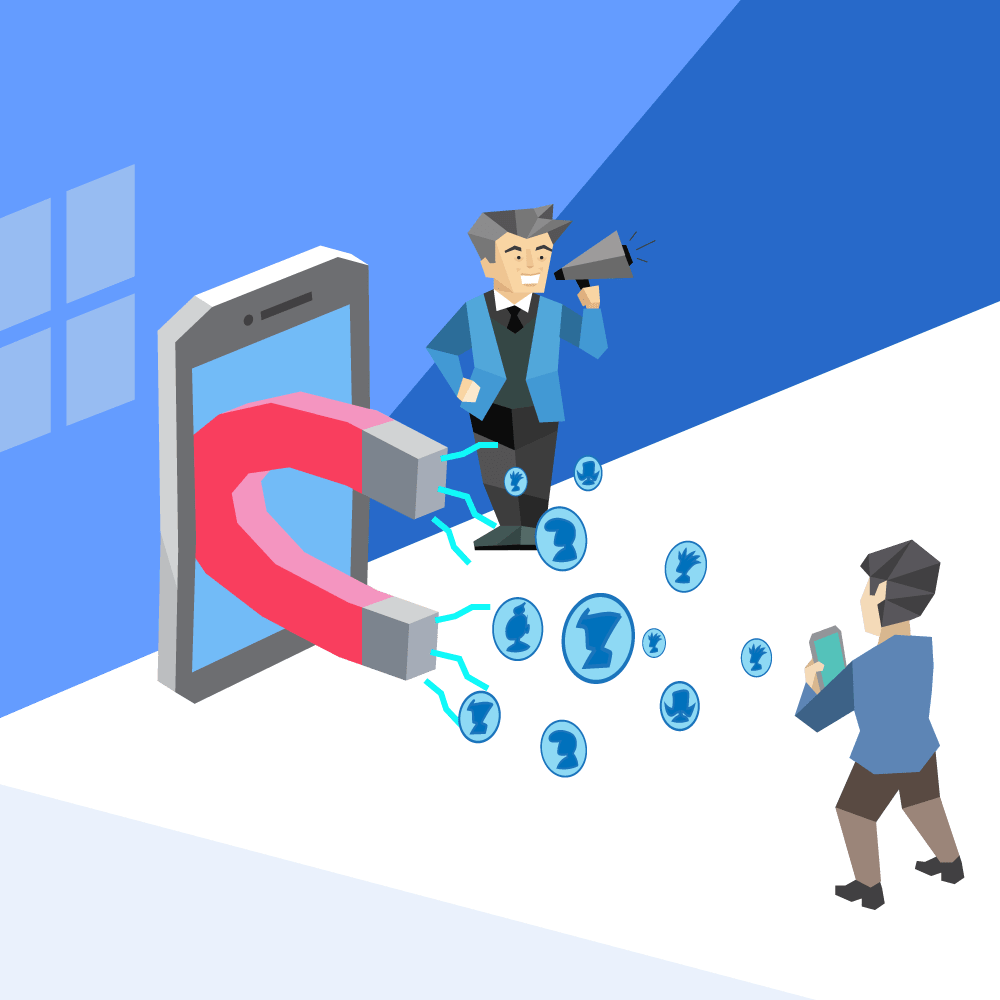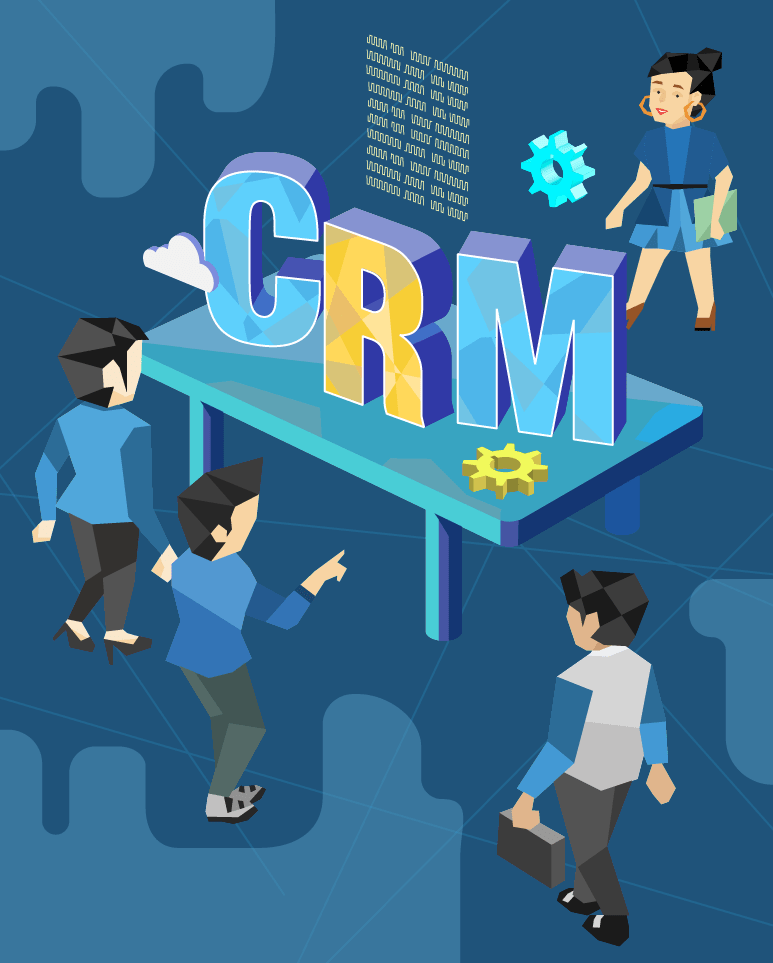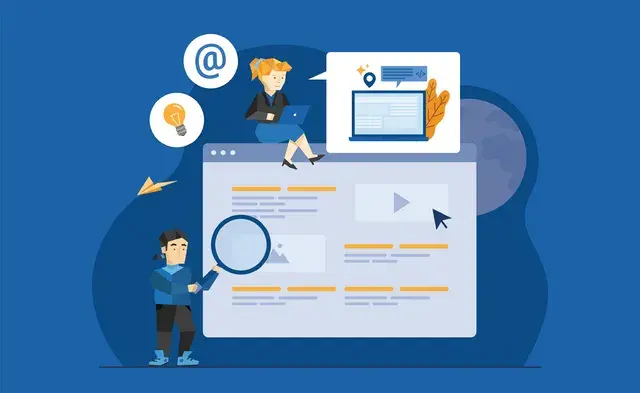
A basic WordPress website should provide visitors with an easy way to contact them, whether via a phone number, a chat feature, or a contact form they can fill out. Many businesses use a combination of these, if not all of them.
However, once your visitor has converted into a customer, you’ll want to step up your customer service.
You should afford your customers the privilege of having all their questions and concerns addressed as quickly as possible. Because of this, the traditional methods of contact may not be convenient enough for them. If you want to provide the best potential support for your clients, consider setting up a WordPress client portal.
What Is A Client Portal?
A client portal is a part of your website that’s only accessible to your clients. We give restrictions to access to those without a login and password. Those who have a login and password (which you would provide to your customers) can access a “portal” that provides them with a more personalized website experience.
They can customize their customer profiles, view their purchase history, get faster customer support, access various resources, and upload different files.
Benefits Of Using A Client Portal
When giving them access to a client portal, you’re rewarding your clients with a more convenient, personalized website experience. Setting up a client portal will provide your business and your clients with quite a few benefits.
The following are just a few perks of a WordPress client portal:
Improve Communication
By providing a client portal to your customers, you make it easier to keep track of your customers’ messages. Otherwise, customers would use multiple channels to reach out to you, making it challenging to track all incoming messages from various sources.
Keeping track of all your notifications in one unified portal will make communication more efficient and effective.
Provide A Better Customer Experience
A customer portal’s existence shows new customers you have put a lot of time and effort into building a website experience tailored to your customers’ needs. Customers will appreciate the ability to access information, receive customer support, and communicate quickly and efficiently with you.
The ability to customize your website experience via the customer portal will also significantly improve the overall customer experience. Of course, the better your customer experience is, the more brand loyalty you’ll develop.
Centralize Point Of Information
Client portals are incredibly convenient for customers because they can access all of their account information.
Clients can find information such as their purchase history, personal preferences, and a wide range of resources in the portal, providing them a platform they can turn to for help. Centralizing all of this information makes it easier for your customers to find and access it.
Reduce Customer Support Costs
Although a client portal’s purpose is to improve customer support, it can also help you substantially reduce your customer support costs. A client portal can provide your customers with a self-support system.
For example, this system can include resources that will help guide your customers through common issues. They’ll solve smaller problems on their own through your client portal, which means they won’t have to speak with an actual customer support rep.
The less your customers have to rely on your customer support team for help, the less your customer support costs will be.
Increase Upselling And Cross-Selling Opportunities
Although email is still an effective way to upsell and cross-sell products and services, having a client portal will allow you to share exclusive data about new products and services with all existing customers. You can even recommend new products and services on the front page of your client portal.
Essentially, the portal makes it easier to share cross-selling and upselling opportunities with all of your customers and encourages them to seek more information on those opportunities.
Since you can use your client portal as a centralized point of information, it will be a lot easier for customers to delve deeper into any upselling or cross-selling opportunities you present to them.
What Makes A Good Client Portal?
To add a client portal to your WordPress website, you will need to download a client portal plugin. You’ll find there are a lot of different client portal plugins available for WordPress.
Before you choose one, you should know what a good client portal is. Selecting the wrong client portal plugin can be disastrous. A poorly designed client portal can hurt your website experience and leave your customers frustrated.
These are some factors that contribute to an effective client portal:
Strong Security Features
Use a client portal that provides several levels of authentication and security. Making sure that your customers’ personal information will remain secure is critical. If your portal were to be hacked and your customer data leaked or stolen, it would severely hurt the trust customers have in your brand.
The client portal you choose should include:
- HTTPS protocol
- SSL (secure sockets layer)
- LDAP (lightweight directory access protocol)
- Single Sign-On
- IP Whitelists
- Password Expiration Policy
An Intuitive Interface
Your client portal should make your website more convenient for customers to use. One of the fundamental goals is to improve their overall customer experience. If your portal’s interface is poor, it will only hurt your customer experience.
The portal you choose needs an intuitive interface that makes the portal easy to navigate and understand.
Permission-Based Controls
Because of the sensitive customer data accessible via your customer portal, be sure you can control who has access to it. Permission-based controls ensure you can restrict access to specific employees and you can just as easily remove permissions when needed (such as if an employee with access leaves your organization).
Easy Integration
Ensure the plugin will be easy to integrate with your WordPress website and that it won’t cause any issues when you implement it. Consider plugins that offer other integrations, such as with your CRM, or a payment processor, to accept payments via your portal.
User-Friendly Functionality
Besides an intuitive interface, the portal should provide users with functionality that further improves their customer experience.
For example, the ability to customize their profile, find the information they’re looking for, change their account, place orders, and arrange online payments should be easy for customers to do through your portal.
Full Support
Choose a client portal plugin from a developer that provides extensive support to its customers. Make sure they offer the help you need when implementing the plugin and maintaining it.
Ask if someone will be available to provide the support if you encounter issues down the road or if you have questions about some features or functionality.
Scalability And Adaptability
As your business grows, be sure your client portal can scale and adapt. It should be able to handle an increase in users as your customer base expands. And as your company strengthens, you’ll want a client portal that provides some flexibility to adapt to changing needs.
Best Client Portal Plugins
Now that you know what to look for in the right client portal, it’s time to look at your options.
Unfortunately, the number of client portal plugins available can be overwhelming. To help save you some time, the following are eight of the best client portal plugins available for WordPress sites:
1. Ontraport
Ontraport is far more than a WordPress membership plugin. It houses a full capability of managing a very intricate WordPress portal (or a more secure one using their page builder without using WordPress at all).
This is a side benefit of their primary CRM and automation suite. We have built countless client portals with Ontraport across the last five years, and it remains our number one recommendation!
Features
These are just some qualities we love about Ontraport.
- Sales & CRM platform to help you visually keep track of prospects
- Marketing automation that helps you scale your process and provides a personalized journey for each customer – on autopilot.
- Pages and forms that are completely customizable using their page builder (or a custom theme)
- Built-in integration with Stripe, Authorize.net, PayPal, and Paymill
- Integrated with WordPress.com for comments, social networks
- Sophisticated user-level and role-based permissions
2. SuiteDash
SuiteDash is a popular client portal plugin packed with features A Start Plan is available for $19/month, which allows unlimited portals and CRM contacts, free updates, and 100 GB of file storage. There are two other plans available.
Features
You’ll find SuiteDash has features that are hard to ignore.
- Invoice generation and online payments
- Project management, CRM, and live chat
- Fully encrypted data with the same information shared in all of its components, which means you won’t have to copy or duplicate entries
- Slick dashboard with all of your client, project and invoice details in one place
- Fast and intuitive interface
- Social media integration so you can post company news, product updates, and more on your social pages
3. MemberPress
MemberPress was one of the first client portal or password protected WordPress plugins we ever used. We have always found complete satisfaction with their offering, and only stopped using it when we started rolling out Ontraport for most portal needs.
If you need something simple and reliable for locking down certain content inside your WordPress, then this out-of-the-box tool will be exactly what you need.
Features
Here are some of its features you may find helpful to you.
- Manage member access to content using group-based permissions
- Lock down posts, pages, categories, WooCommerce products
- Allow users to download files and images from secure sections of your site
- Create custom pricing levels that allow you to set different price points for each individual product or service
4. MemberMouse
MemberMouse allows both you and your clients to upload any size and type of files. Importing existing clients into the MemberMouse portal is easy as well. One of its more unique features is serving custom home pages based on your customers’ membership levels.
Their Builder plan is available for $29/month (or $24.08 if billed annually) and includes all payment and email integrations as well as 1-click purchases and upsells.
Features
MemberMouse boasts of a few more great perks, too.
- Order history, access rights, and engagement statistics
- Ability to update client profiles and billing details
- Wide selection of integrations that include MailChimp, PayPal, Stripe, and more
5. Client Portal
We consider Client Portal a premium plugin option that offers a wide selection of features and functionality to your customers.
There are currently two plans available: a Single Site License ($199/year) and a Multiple Site License ($399/year). The Single Site License provides unlimited portals and clients for one website, one year of free updates and support. You can keep the plugin if you don’t renew your subscription as well.
Features
Client Portal offers these outstanding features you may like.
- Get built in sections devoted to content, contracts, invoice receipts, deliverables, prototypes, and more
- Customize your sections as you like
- Host unlimited client portals and share them as a sub-user
- Automatic updates to ensure you always have the latest version installed on your site
- Integrate with email services like MailChimp, Constant Contact, Get Response, AWeber, and many more
6. LearnDash
If your focus is on educating your customers, then LearnDash is a good option.
It’s a plugin that’s favored by teachers for use by their students, but you can also use it for valuable content and training resources you want to offer to customers only.
Three plans are available, including the Basic Package for a one time $159 fee that includes a one-site license and one year’s worth of support and updates.
Features
We want to highlight what LearnDash can do for your site here.
- Ability to drip-feed content, set up engagement triggers, sell courses and more
- Availability of tons of integrations you can add to the portal, such as Stripe, WooCommerce, Zapier, and more
- Course builders that will allow you to create dynamic content
- Advanced marketing and sales platform that lets you price your courses, schedule payments, and start taking orders.
7. Simple Membership
Simple Membership is a free plugin that lets you create a secure client portal for your site members. It makes it easy to customize your client portal’s appearance to reflect your branding better.
Features
Using this plugin might pleasantly surprise you as it offers a ton of features.
- Set up an unlimited number of membership levels (free and paid memberships)
- Customers can pay for membership using PayPal, Stripe, or Braintree
- Members can use the portal to access protected content through their dashboards
- Comes with an editor that lets you add pages, a forum, and new posts to your client portal
- Add private browsing and generate content restrictions
8. Client Dash
If you do not need an extensive set of features, Client Dash is a good option. It’s a simple plugin that offers all the essential features that a standard client portal plugin provides, making the user interface simple and easy to use.
One of the most significant advantages of using the Client Dash plugin is that it’s open-source, which means it’s free.
Features
Here are some features you can expect from this plugin.
- Add, remove, and rearrange WP dashboard widgets with ease
- Customizable user interface with over 20 color schemes to choose from
- Invoice generation and online payments
- Multi-language support and RTL readiness
- Support for custom fields and taxonomies, so you can include information like job title, project name, deliverables, client name, and more
- Ability to restrict access to certain pages using user roles
- Quick log in via the WP admin bar
Custom Development Vs. WordPress Plugins
Although there are plenty of reliable WordPress plugins to choose from that allow you to add a client portal to your website, they don’t always provide the customization that you may need. They’re out-of-the-box solutions, which means that you might want to consider developing your custom client portal if you have specific needs. It does take more work and will require knowledgeable developers, whether you hire them in-house or decide to outsource. Be sure to ask yourself the following questions when choosing between custom development and an existing WordPress plugin:
What Features Do You Need?
There may be specific features that you need your client portal to have, such as customers’ ability to manage payments through the portal. Not all plugins will have all of the features you need. You may even have a tough time finding the right plugin if you have a laundry list of features that you want. Custom development might be the way to go if this is the case. Additionally, when you pay for a plugin, it may come with features that you don’t need. Not only are you paying for features you won’t use, but they could also intrude on your user experience. This intrusion is especially likely if there are dozens of features available in the client portal that will be of no use to your customers.
What Kind Of Budget Do You Have?
Some plugins are open-source or are available for one-time fees. However, these are limited in their functionality. More robust plugins will be more expensive and will need to be renewed every year. Additionally, you may have to upgrade your plan as your business grows. When it comes to custom development, the upfront cost might seem significantly higher. Still, you’ll have more flexibility, and it could save you money over the long run, especially since you’ll be able to deploy it across multiple domains.
Do You Need A Temporary Or Long-Term Solution?
If you’re just adding a client portal to provide your customers with a couple of specific features and more of a temporary fix to your existing WordPress site, then a plugin will do just fine. However, if you’re looking to implement a long-term solution, you may want to consider custom developing your client portal.
How Will Your Choice Affect The Front-End Design Of Your Site?
One thing to be careful of when choosing a plugin is that it could affect your site’s front-end. If it changes the front-end of your site, it could slow down your website. The more files and the larger those files are, the more likely it will slow down your site. When you implement a plugin with features you don’t need, you could end up bogging down your site for no reason.
How Specific Are Your Client Portal Needs?
If you don’t have too many specific needs and only have a couple of general features that you want your portal to have, then a plugin should suit your needs. However, if you have many requirements specific to your industry, custom development is likely your best option.
How Much Ongoing Maintenance Will be Needed?
You can build your client portal with your future needs in mind so that it won’t require a lot of maintenance. Still, you should expect to update some elements in the future, whether you’re looking to add new functionality or simply update certain features. However, with a plugin, you will receive a certain level of support based on your subscription plan. Unfortunately, some plans offer limited support. For example, plugins with one-time fees often only provide a year’s worth of support and updates.
We Customize Client Portals For Those Who Need More
A client portal is an incredibly useful feature for your existing customers and can go a long way towards improving your overall customer experience. While there are plenty of excellent client portal plugins available for WordPress sites, you may want to consider custom development if you have specific needs outside of the typical plugin.









